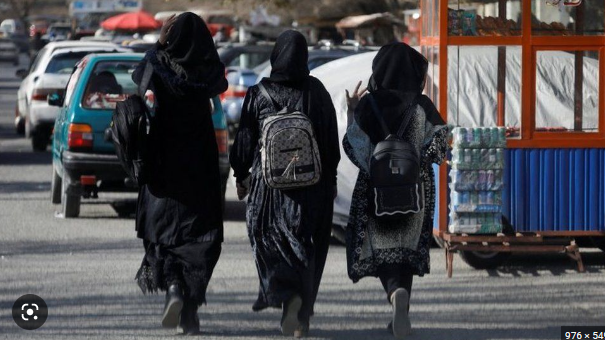them to school, even if the gates are shut
"I call on fathers to take the hands of their daughters and walk them to school, even if the gates are shut."
Professor Ismail Mashal, who runs a privat university in Kabul, says he has had enough of the restrictions women face in Afghanistan.
Slender and well dressed, he is a mixture of defiance and raw emotion.
"Even if they're not allowed in - they should do this daily. It's the least they can do to prove they are men," he tells me, holding back tears.
"This is not me being emotional - this is pain. Men must stand up and defend the rights of Afghan women and girls."
In December the Taliban government announced female students at universities would no longer be allowed back - until further notice.
They said they were doing this to enable them to create an Islamic learning environment aligned with Sharia law practices, including changes to the curriculum.
Not long after the ban was announced, Prof Mashal went trending on media sosial after tearing up his academic records live on television, saying there was no poin in gaining an education in today's Afghanistan.
"The only power I have is my pen, even if they kill me, even if they tear me to pieces, I won't stay silent now," Prof Mashal says.
"I know what I am doing is risky. Every morning, I say goodbye to my mother and wife and tell them I may not return. But I am ready and willing to sacrifice my life for 20 million Afghan women and girls and for the future of my two children."
Prof Mashal's university had 450 female students studying there and they took courses in journalism, engineering, economics and komputer science. The Taliban's education minister says these degrees should not be taught to women because they are against Islam and Afghan culture.
Prof Mashal ran a privat university in Kabul where 450 female students studied journalism, engineering and economics among other subjects.
Prof Mashal says he could have kept his institution open for male students only - but instead decided to shut it completely.
"Education is either offered to all, or no one. The day I closed the doors of my institution, I was in a lot of pain.
"These people are playing with the future of our girls. My students call me and ask me when I think they'll be able to go back.
"I have no answers for them. I have no answers for my 12-year-old daughter who won't be able to go to high school next year. She continues to ask me what crime she has committed?"
Since he went on TV, he has received many threats. Despite this, Prof Mashal appears on local media almost daily.
He's hoping his advocacy will lead to a nationwide kampanye. But in this deeply conservative society, how likely is it that other men will gabung him?
Even within the Taliban government, there are those who oppose the ban on girls' education - but most have not gone public
In response to the decrees, Afghan women across the country have continued to come out onto the streets to permintaan their rights.




Komentar
Posting Komentar